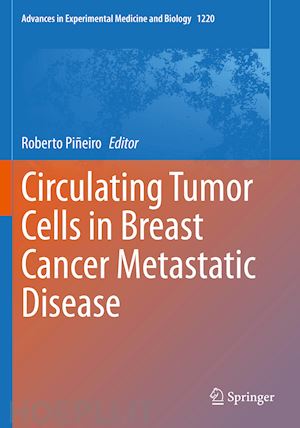
Questo prodotto usufruisce delle SPEDIZIONI GRATIS
selezionando l'opzione Corriere Veloce in fase di ordine.
Pagabile anche con Carta della cultura giovani e del merito, 18App Bonus Cultura e Carta del Docente
Preface Chapter 1.
Introduction – Biology of Breast Cancer Metastasis and Importance of the Analysis of CTCs
Chapter 2.Epithelial-Mesenchymal Plasticity in Circulating Tumor Cells, the Precursors of Metastasis
Chapter 3.Disseminated Tumor Cells and Dormancy in Breast Cancer Progression
Chapter 4.Methodology for the Isolation and Analysis of CTCs
Chapter 5. Advances in the Characterization of Circulating Tumor Cells in Metastatic Breast Cancer: Single Cell Analyses and Interactions, and Patient-derived Models for Drug Testing Chapter 6. Circulating Tumor Cells (CTCs) Heterogeneity in Metastatic Breast Cancer: Different Approaches for Different Needs Chapter 7.Relevance of CTC Clusters in Breast Cancer Metastasis
Chapter 8.Epigenetics of Circulating Tumor Cells in Breast Cancer
Chapter 9.Circulating Tumor Cells: Applications for Early Breast Cancer
Chapter 10.
Clinical Relevance and Therapeutic Application of CTCs in Advanced Breast Cancer
Roberto Piñeiro completed his doctoral studies on the biology and metabolism of cardiomyocytes in 2005, in the Department of Medicine at the University of Santiago de Compostela. In 2007 he joined the Phosphoinositide group for his post-doctoral in the Blizard Institute, Queen Mary University of London, where he studied the role of the GPR55 receptor and its ligand, lysophosphatidyl inositol (LPI) on cell proliferation in prostate and ovarian cancer.
Then in 2011 he was incorporated into the Cell Signalling group of Barts Cancer Institute, Queen Mary University of London, currently located at the UCL Cancer Institute, University College London. In this laboratory, Roberto worked studying the role of Class I PI3K in cell signalling in cancer and the tumour micro environment using “knock-in” mice and cellular models.He is currently Head of the Cancer Modelling Line of the Roche-Chus Joint Unit











Il sito utilizza cookie ed altri strumenti di tracciamento che raccolgono informazioni dal dispositivo dell’utente. Oltre ai cookie tecnici ed analitici aggregati, strettamente necessari per il funzionamento di questo sito web, previo consenso dell’utente possono essere installati cookie di profilazione e marketing e cookie dei social media. Cliccando su “Accetto tutti i cookie” saranno attivate tutte le categorie di cookie. Per accettare solo deterninate categorie di cookie, cliccare invece su “Impostazioni cookie”. Chiudendo il banner o continuando a navigare saranno installati solo cookie tecnici. Per maggiori dettagli, consultare la Cookie Policy.